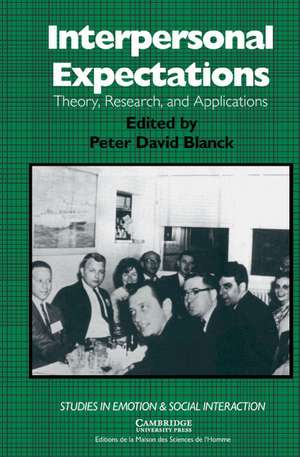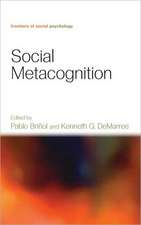Interpersonal Expectations: Theory, Research and Applications: Studies in Emotion and Social Interaction
Editat de Peter David Blancken Limba Engleză Paperback – 23 sep 1993
| Toate formatele și edițiile | Preț | Express |
|---|---|---|
| Paperback (1) | 360.39 lei 6-8 săpt. | |
| Cambridge University Press – 23 sep 1993 | 360.39 lei 6-8 săpt. | |
| Hardback (1) | 1030.93 lei 6-8 săpt. | |
| Cambridge University Press – 23 sep 1993 | 1030.93 lei 6-8 săpt. |
Din seria Studies in Emotion and Social Interaction
-
 Preț: 177.14 lei
Preț: 177.14 lei -
 Preț: 154.69 lei
Preț: 154.69 lei -
 Preț: 201.48 lei
Preț: 201.48 lei - 14%
 Preț: 787.78 lei
Preț: 787.78 lei - 9%
 Preț: 694.81 lei
Preț: 694.81 lei -
 Preț: 323.18 lei
Preț: 323.18 lei -
 Preț: 397.46 lei
Preț: 397.46 lei -
 Preț: 322.62 lei
Preț: 322.62 lei -
 Preț: 354.03 lei
Preț: 354.03 lei -
 Preț: 353.02 lei
Preț: 353.02 lei -
 Preț: 287.87 lei
Preț: 287.87 lei -
 Preț: 449.38 lei
Preț: 449.38 lei -
 Preț: 327.68 lei
Preț: 327.68 lei - 11%
 Preț: 426.80 lei
Preț: 426.80 lei - 14%
 Preț: 729.08 lei
Preț: 729.08 lei - 11%
 Preț: 700.16 lei
Preț: 700.16 lei - 14%
 Preț: 727.26 lei
Preț: 727.26 lei - 14%
 Preț: 793.59 lei
Preț: 793.59 lei -
 Preț: 353.10 lei
Preț: 353.10 lei -
 Preț: 389.84 lei
Preț: 389.84 lei -
 Preț: 423.39 lei
Preț: 423.39 lei - 11%
 Preț: 528.82 lei
Preț: 528.82 lei -
 Preț: 361.92 lei
Preț: 361.92 lei -
 Preț: 327.20 lei
Preț: 327.20 lei - 14%
 Preț: 725.57 lei
Preț: 725.57 lei -
 Preț: 346.23 lei
Preț: 346.23 lei - 14%
 Preț: 898.82 lei
Preț: 898.82 lei - 14%
 Preț: 676.89 lei
Preț: 676.89 lei - 5%
 Preț: 357.54 lei
Preț: 357.54 lei - 14%
 Preț: 853.80 lei
Preț: 853.80 lei -
 Preț: 360.26 lei
Preț: 360.26 lei -
 Preț: 378.36 lei
Preț: 378.36 lei - 14%
 Preț: 726.23 lei
Preț: 726.23 lei -
 Preț: 364.42 lei
Preț: 364.42 lei - 11%
 Preț: 469.84 lei
Preț: 469.84 lei
Preț: 360.39 lei
Nou
Puncte Express: 541
Preț estimativ în valută:
68.97€ • 74.89$ • 57.93£
68.97€ • 74.89$ • 57.93£
Carte tipărită la comandă
Livrare economică 22 aprilie-06 mai
Preluare comenzi: 021 569.72.76
Specificații
ISBN-13: 9780521428323
ISBN-10: 0521428327
Pagini: 524
Dimensiuni: 157 x 237 x 29 mm
Greutate: 0.69 kg
Ediția:New.
Editura: Cambridge University Press
Colecția Cambridge University Press
Seria Studies in Emotion and Social Interaction
Locul publicării:New York, United States
ISBN-10: 0521428327
Pagini: 524
Dimensiuni: 157 x 237 x 29 mm
Greutate: 0.69 kg
Ediția:New.
Editura: Cambridge University Press
Colecția Cambridge University Press
Seria Studies in Emotion and Social Interaction
Locul publicării:New York, United States
Cuprins
Preface Peter David Blanck; 1. General introduction: interpersonal expectations: some antecedents and some consequences Robert Rosenthal; 2. Systematic errors to be expected of the social scientist on the basis of a general psychology of cognitive bias Donald T. Campbell; Part I. Research on Interpersonal Expectations John M. Darley, Kathryn C. Oleson, Peter David Blanck, Marylee Taylor, Elisha Babad, Dov Eden, Howard S. Friedman, Miron Zuckerman, Holley Hodgins, Kunitate Miyake and Harris Cooper; Part II. Research on the Mediation of Interpersonal Expectations through Nonverbal Behavior Ross Buck, Dane Archer, Robin Akert, Mark Costanzo, Bella M. PePaulo, Judy Hall, Nancy Briton, M. Robin Di Matteo and Klaus Scherer; Part III. The Study of Interpersonal Expectations Dane Archer, Monica J. Harris, Frank J. Bernieri, Don B. Rubin, Ralph L. Rosnow, Mary Amanda Dew and Marylee Taylor.
Recenzii
"An excellent resource for those interested in the phenomenon of interpersonal expectations....Ideas explored include an interest in the accuracy of perceptions of nonverbal behaviors, gender differences in nonverbal behaviors and expectations in the physician-patient relationship." C.L. Kleinke, Choice
"In this volume, dedicated to Rosenthal, readers will enjoy some rare and wonderful historical perspectives of this line of research as well as examine a representative cross-section of the current work in the area. The collection of well-organized and well-edited chapters is a necessary addition to the library of the serious social interaction scholar and should also be enjoyed by graduate student and advanced undergraduate student audiences....This volume does a superior job of bringing together theory, research, and applications of Rosenthal's initial work on interpersonal expectations. The first such systematic effort of its kind, the high quality and broad scope of the work, as well as the prominence of the contributors to the volume attest to the significant contributions Rosenthal has made to the field." John T. Copeland and Diana J. Kyle, Contemporary Psychology
"In this volume, dedicated to Rosenthal, readers will enjoy some rare and wonderful historical perspectives of this line of research as well as examine a representative cross-section of the current work in the area. The collection of well-organized and well-edited chapters is a necessary addition to the library of the serious social interaction scholar and should also be enjoyed by graduate student and advanced undergraduate student audiences....This volume does a superior job of bringing together theory, research, and applications of Rosenthal's initial work on interpersonal expectations. The first such systematic effort of its kind, the high quality and broad scope of the work, as well as the prominence of the contributors to the volume attest to the significant contributions Rosenthal has made to the field." John T. Copeland and Diana J. Kyle, Contemporary Psychology
Descriere
This 1993 volume explores a sub-area of social psychology - called interpersonal expectation - that studies how the expectation of one person affects the behavior of another.













